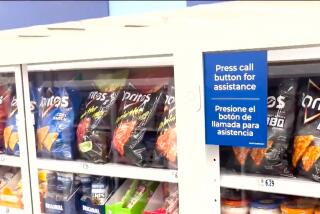Illegal Pharmacies Plague Immigrant Areas
More than three years after a toddler died from an injection at a backroom clinic, Orange County and state officials said illegal pharmacies remain a serious problem in immigrant communities.
Authorities are now wrapping up what they consider several important cases against the clinics. The Orange County district attorney’s office is expected to file charges this week against four Little Saigon businesses it raided in April.
At the same time, Assemblyman Ken Maddox (R-Garden Grove) is pushing a bill that would stiffen the penalties against those who operate illegal pharmacies.
“We give people harsher sentences for drunk driving and other crimes than what we give people playing doctor in the back of a liquor store,” said Maddox, who is trying to get his bill out of an Assembly committee. “It’s just another way to exploit the poor, [who] most often tend to be immigrants.”
Backroom clinics are tucked inside gift shops, health-food and fabric stores, even bakeries. Poor residents, usually immigrants, often look to the clinics for cheap medication without having to worry about seeing a doctor first.
Authorities said the clinics pose a significant danger by peddling drugs that are sometimes illegally manufactured or whose expiration dates have passed. Often, the medications are administered by people who are not doctors.
“They [patients] don’t get the right drug for the right condition,” said Susan Bond, drug and consumer product safety section chief for the state Department of Health Services. “Some drugs may be counterfeit. They may be toxic. They may be unsafe.”
They may also be deadly.
In April 1998, 13-month-old Christopher Martinez died in Santa Ana while being treated for the flu at a storefront clinic by a man not licensed to practice medicine.
A year later, an 18-month-old Anaheim girl was given an injection of illegal imported drugs at a gift shop in Tustin that doubled as a clinic. Her parents, who did not have medical insurance, paid $37 for what they thought was a shot of penicillin. Selene Segura Rios died hours later.
Officials said they don’t have a good handle on how many illegal clinics are operating. Tips from the public--which jumped in the months after the baby’s death--have declined. But authorities said their investigations continue to uncover clinics.
Some clinics are becoming more sophisticated. They move their businesses more frequently and have new ways to avoid detection. “I’ve heard of cases where they keep it in their cars, not in their stores,” said June Nakagawa, a senior investigator with the state’s Department of Health Services’ food and drug branch.
Operating an illegal pharmacy is a misdemeanor. But Maddox’s proposed law would allow district attorneys to prosecute the crime as a felony.
In the most recent cases, investigators from the Orange County district attorney’s office and the state Department of Health Services teamed up for a yearlong probe into several businesses in Little Saigon.
According to search warrants:
Undercover investigators entered one small, crowded shop in the Asian Garden Mall in Westminster and discovered products labeled “Rx Only,” indicating they can be sold only with a prescription.
An investigator bought one of the products for $35. Investigators also bought a prescription ointment for itchy skin for $1.50, along with two more prescription drugs. Most of the labeling was in Chinese. At other stores, the investigators purchased topical prescription skin creams, all without prescriptions.
Operators of two of the targeted businesses had been warned not to sell the pharmaceuticals during a similar crackdown by state investigators in 1998.
Four years ago, investigators told the store operators how to distinguish between drugs that could be sold over the counter and those that require a prescription. In turn, the operators promised to stop illegally selling the drugs and avoided prosecution.
This time, prosecutors are taking a tougher approach. Orange County Deputy Dist. Atty. Byron Nelson said the shop operators will face charges that include sale of illegal narcotics, operating a pharmacy without a license and dispensing mislabeled and dangerous pharmaceuticals without a license.
One business owner, Nicholas Chung, said he did not know the drugs he was selling were illegal. “They told me and I stopped right then. I’m not selling anymore,” he said.
Authorities acknowledge they face hurdles in their attempts to stamp out the practice, including the continued support of the makeshift clinics by residents.
Nevertheless, they are “trying to get the message out that ... we’ll be watching,” Nakagawa said.
More to Read
Sign up for Essential California
The most important California stories and recommendations in your inbox every morning.
You may occasionally receive promotional content from the Los Angeles Times.











